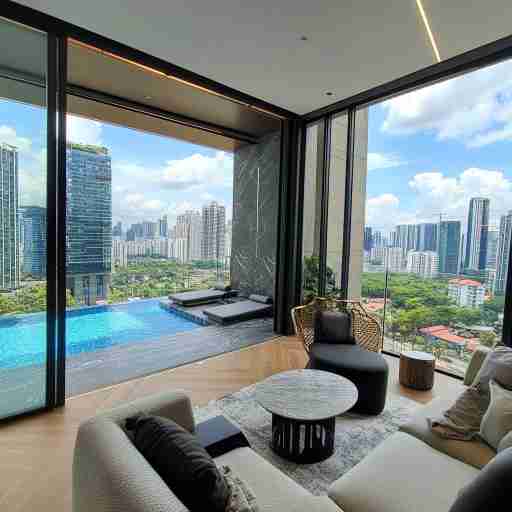:
The decision to invest in a condo in Singapore is increasingly favored by both local and international investors, drawn in by the country’s strong economy, stable political landscape, and exceptional quality of life. With an abundance of opportunities in the real estate market, condos stand out as a top choice due to their convenient location, modern amenities, and potential for lucrative rental yield. In this article, we will delve into the advantages, important considerations, and essential steps to take when venturing into the condo market of Singapore.
Insulation is a vital part of any property, as it helps to regulate temperature and reduce energy costs. Traditional insulation materials such as fiberglass and foam may be effective, but they come with some drawbacks. These include potential health hazards, higher energy costs, and a negative impact on the environment. This is where eco-friendly insulation options come in.
By choosing eco-friendly insulation options, property owners can save on energy costs in the long run. These insulation materials have a higher R-value per inch, meaning they can provide the same level of insulation with less material. This not only translates to cost savings in terms of material but also in terms of installation and maintenance. Additionally, since these materials are more durable, they have a longer lifespan, reducing the need for frequent replacements and repairs.
1. Energy Efficiency
In conclusion, eco-friendly insulation options offer many benefits that can help maximize rental yield. From energy efficiency and cost savings to improved indoor air quality and soundproofing, these materials have a lot to offer. Additionally, their positive impact on the environment and the increasing demand for sustainable properties make them a wise investment for property owners. As we continue to see a shift towards eco-friendly living, incorporating these insulation options in rental properties can give property owners a competitive edge and attract tenants who are willing to pay more for a sustainable and comfortable living space.
Eco-friendly insulation options, also known as green insulation, are made from sustainable and renewable materials, making them a more environmentally-friendly choice. These materials not only have a lower carbon footprint, but they also have several other advantages that can help maximize rental yield. Let’s take a closer look at these benefits.
In addition to the above benefits, eco-friendly insulation options also have a positive impact on the overall value of the property. As more and more people become environmentally conscious, the demand for sustainable properties is on the rise. By incorporating eco-friendly insulation options, property owners can increase the value of their property and attract potential tenants who are willing to pay a premium for a sustainable living space.
3. Improved Indoor Air Quality
5. Environmentally-Friendly
One of the main advantages of eco-friendly insulation options is their ability to provide better energy efficiency. Traditional insulation materials, such as fiberglass, can lose their effectiveness over time due to moisture and settling. This means that as time goes by, the insulation’s R-value (a measure of its thermal resistance) will decrease, and energy costs will increase. On the other hand, eco-friendly insulation options, such as cellulose and spray foam, are more resistant to settling and moisture, ensuring that they maintain their effectiveness and provide consistent energy savings over time.
2. Cost Savings
To effectively invest in real estate in Singapore, it is imperative for international investors to be well-informed about the laws and limitations surrounding property ownership. While there are fewer restrictions on purchasing condominiums compared to landed properties, foreign buyers must adhere to the ABSD of 20% for their initial property acquisition. This added expense, however, is outweighed by the reliable growth and stability of the Singapore property market, making it a desirable option for foreign investment. As such, it is essential for foreign investors to conduct thorough research and strictly adhere to all regulations to ensure legal compliance.
Another advantage of eco-friendly insulation options is their ability to provide soundproofing. Properties located in noisy areas, such as near airports or major highways, can benefit significantly from this feature. Eco-friendly insulation options, such as cellulose and mineral wool, have excellent sound-absorbing properties, reducing noise levels and creating a more comfortable living space for tenants.
Perhaps the most apparent advantage of eco-friendly insulation options is their positive impact on the environment. These materials are made from renewable and sustainable resources, reducing the reliance on non-renewable resources such as fossil fuels. They also have a lower carbon footprint, making them a more environmentally-friendly choice. This can be a significant selling point for environmentally-conscious tenants, resulting in higher occupancy rates and rental yield.
So, don’t miss out on the chance to be a part of this thriving market and reap the rewards for years to come.
Therefore, it is crucial for foreign investors to thoroughly research and comply with all regulations to avoid any legal consequences.
4. Soundproofing
In recent years, there has been a growing trend in the real estate market towards sustainable and eco-friendly living. This shift has been driven by a growing concern for the environment and the need for more energy-efficient solutions. As a result, property investors and homeowners are now looking for ways to not only reduce their carbon footprint but also to maximize their rental yield. One of the most effective ways to achieve this is through the use of eco-friendly insulation options.
Traditional insulation materials, such as fiberglass, can release airborne particles into the air, leading to poor indoor air quality. This can be especially problematic for individuals with respiratory issues or allergies. Eco-friendly insulation options, on the other hand, use natural and non-toxic materials, making them safer for both occupants and installers. This can be a significant selling point for tenants who are increasingly more conscious of the impact of their living environment on their health.


